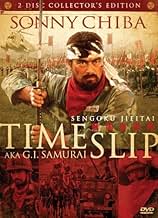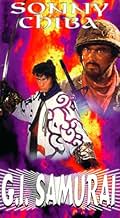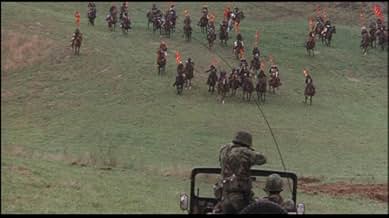PUNTUACIÓN EN IMDb
6,4/10
1,2 mil
TU PUNTUACIÓN
Añade un argumento en tu idiomaJapanese soldiers time travel to feudal era. Their lieutenant allies with samurai lord to become Shogun. Both seek power through different eras' warfare.Japanese soldiers time travel to feudal era. Their lieutenant allies with samurai lord to become Shogun. Both seek power through different eras' warfare.Japanese soldiers time travel to feudal era. Their lieutenant allies with samurai lord to become Shogun. Both seek power through different eras' warfare.
- Premios
- 3 nominaciones en total
Shin'ichi Chiba
- Lt. Yoshiaki Iba
- (as Sonny Chiba)
Reseñas destacadas
I would firstly say that somehow I remember seeing this movie in my early childhood, I couldn't read the subtitles and I thought Sonny Chiba was Sean Connery. But I did really like the concept. If you are not able to at least partially suspend your adult scepticism and embrace your inner seven your old you may want to avoid this movie. That said, having just watched the restored 137 minute version on DVD I have to say I enjoyed it, though not as much as when I was seven ( I remembered the ending ).
There are aspects of the movie that are worthy of criticism , the first 15 minutes and final 15 minutes both have some really comic moments, my favourite being the contrast between scenes acted out in the final 10 minutes and the curious choice of backing music ( listen to the lyrics ).
For an action film there is a great deal of focus on the personal stories of certain soldiers and the social dynamics of the squad as the strain of their time travel takes its toll. By the ending of the movie I had decided that this was a good thing, when seven I though the 'relationship' guff was a bad thing.
For an action film there is also plenty of gratifying gory action, especially a couple of epic battle scenes between the platoon and hordes of Shogun era warriors. The makers of the movie have ensured that as many deaths as possible are bloody and, lets face it, humorous. I thought this was a splendid aspect of the movie when I was a kid, and I am not ashamed to say that I still do.
I also like the fact that the modern day soldiers in general don't spend the movie walking on egg shells trying to avoid altering the space time continuum, they've got heavy calibre machine guns, mortars, rocket launchers, a tank and a helicopter and they're hell bent on making feudal Japan theirs. Which is what I'd like to think any vigorous IMDb user would do in their boots.
In short the movies worth watching, it makes the viewer regret that there are not more movies made with a similar premise, and at the same time offers some hefty hints as to why a movie like G.I. Samurai is so unique.
There are aspects of the movie that are worthy of criticism , the first 15 minutes and final 15 minutes both have some really comic moments, my favourite being the contrast between scenes acted out in the final 10 minutes and the curious choice of backing music ( listen to the lyrics ).
For an action film there is a great deal of focus on the personal stories of certain soldiers and the social dynamics of the squad as the strain of their time travel takes its toll. By the ending of the movie I had decided that this was a good thing, when seven I though the 'relationship' guff was a bad thing.
For an action film there is also plenty of gratifying gory action, especially a couple of epic battle scenes between the platoon and hordes of Shogun era warriors. The makers of the movie have ensured that as many deaths as possible are bloody and, lets face it, humorous. I thought this was a splendid aspect of the movie when I was a kid, and I am not ashamed to say that I still do.
I also like the fact that the modern day soldiers in general don't spend the movie walking on egg shells trying to avoid altering the space time continuum, they've got heavy calibre machine guns, mortars, rocket launchers, a tank and a helicopter and they're hell bent on making feudal Japan theirs. Which is what I'd like to think any vigorous IMDb user would do in their boots.
In short the movies worth watching, it makes the viewer regret that there are not more movies made with a similar premise, and at the same time offers some hefty hints as to why a movie like G.I. Samurai is so unique.
What if a platoon of G.I.'s from the Japanese army were to be send back in time 400 years right in the middle of the feudal wars that led to the formation of the Tokugawa Shogunate? Great pitch right? The movie does exactly what it says on the tin.
Thankfully the writers didn't bother to explain the, usually ridiculous in sci-fi movies, scientific mumbo jumbo of time transport. No how's or why's. They just did. However the time transport sequence itself is trippy as hell and quite beautiful, if not a bit dated. Not as silly as one would imagine.
The rest of the movie follows the premise to a T. But while it loses a bit of steam with the various subplots that follow the G.I.s arrival to medieval Japan, it picks up with a devastating battle sequence. Undoubtedly it's the main order of the day. The whole concept and by extension the movie itself, was probably originated from this simple pitch: what if G.I.'s equipped with the latest in modern warfare were to fight samurais? And boy does it deliver.
The main battle sequence that spans more than half an hour is probably one of THE best of its kind in 70's action/war movies. Not only is it relentless and exhausting in pace and length, it's also a terrific mish-mash of styles and techniques that only unique premises like G.I. Samurai can deliver. I mean, where else would you get the chance to feature tanks, ninjas complete with shuriikens, a helicopter and samurais in the same shot? The G.I. platoon led by lieutenant Iba tears literally through hundreds of extras, gunning them down with machine guns, mortars, grenades and tanks.
This mish-mash of styles is with one foot firmly rooted in the sprawling jidai-geki epic of Kurosawa's Kagemusha or Hiroshi Inagaki's Samurai Banners, while the other is in western action and war movies. There are stylistic touches (like the wonderful slow-motion shots and bloody violence) that bring Sam Peckinpah or Enzo G. Castellari circa Keoma to mind. Japanese cinema has always been influenced by westerns and other Hollywood works and vice versa, and G.I. Samurai effortlessly turns this east-meets-west melting pot into an exciting film.
The film-makers thankfully take the whole thing seriously and the movie benefits immensely from it. Not that tongue-in-cheek mentality is completely absent, it's just that it doesn't try to pander to so-bad-it's-good audiences that enjoy laughing at their movies. The budget was probably hefty, as it is evident in the hundreds of extras, elaborate costumes (very decent for a production that is not a traditional jidai-geki) and special effects. The camera-work and editing are all top notch, almost better than a movie with no higher artistic ambitions deserves.
It's not withouts its flaws either of course. There are many "song" scenes, where all sorts of 70's Japanese rock, disco and country songs play over montages (there's a bonding scene, a love-interest scene, a "war is hell" scene etc). The songs themselves are pretty lame and corny and detract from the whole thing. Although it clocks at a whooping 140 minutes, it flies like a bullet for the most part. Still some scenes, flashbacks and subplots in the first half could have been clipped for a tighter effect.
The cast also deserves a mention, featuring such prominent names as Sonny Chiba, Isao Natsuyagi (Goyokin, Samurai Wolf), Tsunehiko Watase (The Yakuza Papers) and Hiroyuki Sanada, all of them hitting the right notes.
Thankfully the writers didn't bother to explain the, usually ridiculous in sci-fi movies, scientific mumbo jumbo of time transport. No how's or why's. They just did. However the time transport sequence itself is trippy as hell and quite beautiful, if not a bit dated. Not as silly as one would imagine.
The rest of the movie follows the premise to a T. But while it loses a bit of steam with the various subplots that follow the G.I.s arrival to medieval Japan, it picks up with a devastating battle sequence. Undoubtedly it's the main order of the day. The whole concept and by extension the movie itself, was probably originated from this simple pitch: what if G.I.'s equipped with the latest in modern warfare were to fight samurais? And boy does it deliver.
The main battle sequence that spans more than half an hour is probably one of THE best of its kind in 70's action/war movies. Not only is it relentless and exhausting in pace and length, it's also a terrific mish-mash of styles and techniques that only unique premises like G.I. Samurai can deliver. I mean, where else would you get the chance to feature tanks, ninjas complete with shuriikens, a helicopter and samurais in the same shot? The G.I. platoon led by lieutenant Iba tears literally through hundreds of extras, gunning them down with machine guns, mortars, grenades and tanks.
This mish-mash of styles is with one foot firmly rooted in the sprawling jidai-geki epic of Kurosawa's Kagemusha or Hiroshi Inagaki's Samurai Banners, while the other is in western action and war movies. There are stylistic touches (like the wonderful slow-motion shots and bloody violence) that bring Sam Peckinpah or Enzo G. Castellari circa Keoma to mind. Japanese cinema has always been influenced by westerns and other Hollywood works and vice versa, and G.I. Samurai effortlessly turns this east-meets-west melting pot into an exciting film.
The film-makers thankfully take the whole thing seriously and the movie benefits immensely from it. Not that tongue-in-cheek mentality is completely absent, it's just that it doesn't try to pander to so-bad-it's-good audiences that enjoy laughing at their movies. The budget was probably hefty, as it is evident in the hundreds of extras, elaborate costumes (very decent for a production that is not a traditional jidai-geki) and special effects. The camera-work and editing are all top notch, almost better than a movie with no higher artistic ambitions deserves.
It's not withouts its flaws either of course. There are many "song" scenes, where all sorts of 70's Japanese rock, disco and country songs play over montages (there's a bonding scene, a love-interest scene, a "war is hell" scene etc). The songs themselves are pretty lame and corny and detract from the whole thing. Although it clocks at a whooping 140 minutes, it flies like a bullet for the most part. Still some scenes, flashbacks and subplots in the first half could have been clipped for a tighter effect.
The cast also deserves a mention, featuring such prominent names as Sonny Chiba, Isao Natsuyagi (Goyokin, Samurai Wolf), Tsunehiko Watase (The Yakuza Papers) and Hiroyuki Sanada, all of them hitting the right notes.
"GI Samurai" sees Sonny Chiba and some other guys get transported back to civil war stricken feudal Japan for no particular reason, and much carnage ensues. It's a rather over the top essay of sword vs. machine gun that ultimately yields some interesting results.
The plot essentially runs along the rails that you might expect from the title; initial fish-out-the-water antics ("what is this flying metal box?" etc etc), "aren't we better off here" discussions and ultimately a huge battle. The latter is proof that the film doesn't take itself seriously at all, the carnage taking up most of the second half as samurai army battles Chiba's platoon; a face off one would fully expect from the title but it still manages to overwhelm with its inventiveness and extravagance. It's certainly one of the most unique battle sequences of its time and doesn't drag despite its extended length.
Chiba gives a gruff performance as Iba, initially a good leader but someone who finally finds himself questioning his own morals as the situation slowly has an effect on him. This is certainly one of his better vehicles from his terrific CV. By the final act the two worlds have had such an effect on each other you have to wonder if it was a bit of nihilism on the part of the writers, as they seem to be asking "weren't we better off back then?'. But this is maybe reading a bit much into was can generally be described as a hugely entertaining two hours of (almost) non stop action.
The plot essentially runs along the rails that you might expect from the title; initial fish-out-the-water antics ("what is this flying metal box?" etc etc), "aren't we better off here" discussions and ultimately a huge battle. The latter is proof that the film doesn't take itself seriously at all, the carnage taking up most of the second half as samurai army battles Chiba's platoon; a face off one would fully expect from the title but it still manages to overwhelm with its inventiveness and extravagance. It's certainly one of the most unique battle sequences of its time and doesn't drag despite its extended length.
Chiba gives a gruff performance as Iba, initially a good leader but someone who finally finds himself questioning his own morals as the situation slowly has an effect on him. This is certainly one of his better vehicles from his terrific CV. By the final act the two worlds have had such an effect on each other you have to wonder if it was a bit of nihilism on the part of the writers, as they seem to be asking "weren't we better off back then?'. But this is maybe reading a bit much into was can generally be described as a hugely entertaining two hours of (almost) non stop action.
I just finished watching the 139 min version (widescreen) with some friends and we were blown away. I won't bother repeating what others have said. What the filmmakers do with the concept is unexpected and fun. The huge battle is exhausting. Afterwards we were stunned to find there was still nearly 30 minutes left to go but that didn't keep us from being completely involved and entertained.
There is one thing that nearly ruined it and that was the horrific music/songs. Blues, Country/Folk and Rock Ballads do not belong here and every time they are used we all broke out in laughter. It's hideous. You have been warned but the story and storytelling keeps you grounded.
There are several outstanding moments that make you appreciate the talent behind the camera. There are many uses of silence as well as slow-motion photography that work beautifully. I really wish I could erase the music but alas.
Seek this out. It's fun, it's different and it takes you to places you wouldn't expect and that's very refreshing.
There is one thing that nearly ruined it and that was the horrific music/songs. Blues, Country/Folk and Rock Ballads do not belong here and every time they are used we all broke out in laughter. It's hideous. You have been warned but the story and storytelling keeps you grounded.
There are several outstanding moments that make you appreciate the talent behind the camera. There are many uses of silence as well as slow-motion photography that work beautifully. I really wish I could erase the music but alas.
Seek this out. It's fun, it's different and it takes you to places you wouldn't expect and that's very refreshing.
I have a pre-cert copy of this film, which is under the title 'time wars' and it runs at an even shorter time than the 110mins version mentioned here by other users. My copy barely hits 60 mins and the hacked editing shows in a very obvious way. There is little explanation of what is going on; the prostitute from the past seems to be still working at the brothel in the late 1970s; a Samurai appears riding a horse down the street in the 1970s for NO reason and while the ending is reminiscent of Macbeth there is a much a much stronger feeling of MacDuff to the whole finished product. I would like to see an unedited version of this in relation to what people are saying about it as my memory of it is as an instigator of Family arguments
BO!
BO!
¿Sabías que...?
- CuriosidadesInitially the producers approached the Japan Ground Self-Defense Force (JGSDF) for props and vehicles, but the army withdrew its support after reading that soldiers go AWOL in the script. For that reason, old and sometimes outdated equipment (like M3 sub-machine guns) had to be used. The tank featured in the movie was even built entirely from scratch.
- PifiasNone of the vehicles run out of fuel despite being stranded 400 years before the creation of fossil fuels for weeks.
- Versiones alternativasInternational English language version has rock ballads replacing original haunting soundtrack.
- ConexionesReferenced in Fanático (1982)
Selecciones populares
Inicia sesión para calificar y añadir a tu lista para recibir recomendaciones personalizadas
- How long is I Want To?Con tecnología de Alexa
Detalles
- Fecha de lanzamiento
- País de origen
- Idioma
- Títulos en diferentes países
- Time Slip: eclipse en el tiempo
- Empresas productoras
- Ver más compañías en los créditos en IMDbPro
Contribuir a esta página
Sugerir un cambio o añadir el contenido que falta

Principal laguna de datos
By what name was Eclipse en el tiempo (1979) officially released in India in English?
Responde























